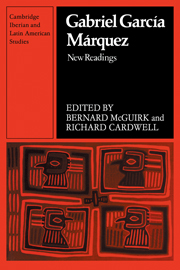Book contents
- Frontmatter
- Contents
- Note on the translations
- List of contributors
- Introduction
- 1 Characterization in the early fiction of Gabriel García Márquez
- 2 Beware of gift-bearing tales: reading ‘Baltazar's Prodigious Afternoon’ according to Marcel Mauss
- 3 The body as political instrument: communication in No One Writes to the Colonel
- 4 Magical realism and the theme of incest in One Hundred Years of Solitude
- 5 Translation and genealogy: One Hundred Years of Solitude
- 6 The humour of One Hundred Years of Solitude
- 7 On ‘magical’ and social realism in García Márquez
- 8 Aspects of narrative structure in The Incredible and Sad Story of the Innocent Eréndira and her Heartless Grandmother
- 9 Language and power in The Autumn of the Patriarch
- 10 Writing and ritual in Chronicle of a Death Foretold
- 11 Free-play of fore-play: the fiction of non-consummation: speculations on Chronicle of a Death Foretold
- 12 A prospective post-script : apropos of Love in the Times of Cholera
- The solitude of Latin America: Nobel address 1982
- Select bibliography
- Index
6 - The humour of One Hundred Years of Solitude
Published online by Cambridge University Press: 05 November 2011
- Frontmatter
- Contents
- Note on the translations
- List of contributors
- Introduction
- 1 Characterization in the early fiction of Gabriel García Márquez
- 2 Beware of gift-bearing tales: reading ‘Baltazar's Prodigious Afternoon’ according to Marcel Mauss
- 3 The body as political instrument: communication in No One Writes to the Colonel
- 4 Magical realism and the theme of incest in One Hundred Years of Solitude
- 5 Translation and genealogy: One Hundred Years of Solitude
- 6 The humour of One Hundred Years of Solitude
- 7 On ‘magical’ and social realism in García Márquez
- 8 Aspects of narrative structure in The Incredible and Sad Story of the Innocent Eréndira and her Heartless Grandmother
- 9 Language and power in The Autumn of the Patriarch
- 10 Writing and ritual in Chronicle of a Death Foretold
- 11 Free-play of fore-play: the fiction of non-consummation: speculations on Chronicle of a Death Foretold
- 12 A prospective post-script : apropos of Love in the Times of Cholera
- The solitude of Latin America: Nobel address 1982
- Select bibliography
- Index
Summary
It is the fate of fine comic writers to be taken seriously. Masters of entertainment like Cervantes and Molière have been woefully misused by those who consider humour and the spinning of a good tale to be worthy of a distinguished artist only when a vehicle for something else. Reappraisals of these two writers have, however, helped to rescue them from critics intent on extracting complex philosophies or literary theories from their comic works. Such reappraisals suggest that García Márquez might similarly be examined with profit first and foremost as a humorist, for there are already clear signs that he is not to escape the fate of his predecessors. One Hundred Years of Solitude, the novel which brought him fame and on which his reputation still largely rests, has been called a work of ‘deep pessimism’, ‘an interpretative meditation’ upon the literature of the sub-continent, or an analysis of ‘the failure of Latin-American history’. Isolated passages of the novel could, at a pinch, be made to support such assertions, but these interpretations will not help us to understand it as a whole nor to account for its remarkable popularity among a heterogeneous readership which has scant knowledge of the history of Colombia or of the recent literary production of Spanish America. Humour, however, can cut across cultural and even linguistic boundaries, appealing to the least and most sophisticated and knowledgeable readers.
- Type
- Chapter
- Information
- Gabriel García MárquezNew Readings, pp. 81 - 94Publisher: Cambridge University PressPrint publication year: 1987
- 2
- Cited by



